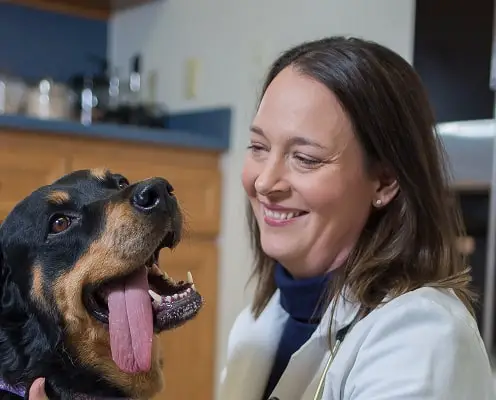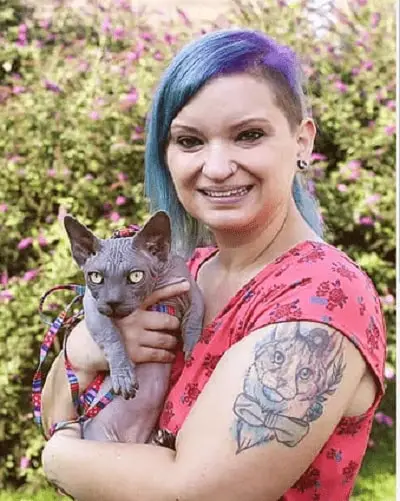Day in the life of
Small Animal Veterinarian – Dr. Sarah Wooten, DVM, CVJ

Typically, I arrive at the clinic around 8 a.m. and start seeing appointments every 30 minutes through lunch, then I have a lunch break where I call owners or review lab work that has arrived, attend a presentation from a local vendor, or write records. In the afternoon, I continue to see patients and write records. I usually go home around 6 p.m. You never know what is going to walk in the door. Your day could consist of kitten and puppy exams and other wellness exams, and simple cases like ear infections or dental examinations, OR you could have three emergencies walk in, anything from a pet that was hit by a car, to a pet that has been vomiting all night – you never know.
Some veterinarians are on call, meaning that after they leave for the day if any emergencies call after hours then they must go back to the hospital to see the patient. I have never done this role – I have always referred after-hour emergencies to the local emergency clinic. This is because the emergency clinic is better equipped than a regular small animal veterinarian to handle emergencies, and I need to rest so that I can give my best to the animals and people that I see the next day.
If I have a surgery day, then I conduct physical exams on my surgical patients and double-check the anesthesia orders before the patients are sedated for surgery. Surgery generally takes all morning, and then I have a lunch break, and then I see patients in the afternoon.
The tasks that take up most of my time include talking to clients, diagnosing problems, prescribing medication, and doing surgery.
Pros
Being a veterinarian is very fulfilling – you feel like you are helping people. Every day is different, and you get constant opportunities to grow yourself, your knowledge, and your expertise – that is why it is called ‘practice!’. The pay and benefits are good, there is excellent job security and high demand for vets, and you do get to snuggle a lot of puppies and kittens. There are many things you can do with a veterinary degree in addition to general practice – you can get board certified in specialties, you can work in government, academia (teaching, industry, or even the military. Vets are also responsible for food safety, so a veterinary degree does have a high degree of versatility.
Cons
In comparison to other medical professionals that require the same level of training, the pay is not as good. For example, a human nurse anesthetist salary starts at over 6 figures, many vets start at only 5 figures, and when you consider all the time and money it takes (many vets graduate with well over $100,000 in debt), the ROI isn’t as good. If you aren’t mindful as a vet, you can burn out early over compassion fatigue – it can be very frustrating to know that you can save a pet but the client doesn’t have the money, so humane euthanasia is elected instead. Conducting euthanasia comes with its own set of emotional challenges, and this plus other factors are leading to vets having a higher suicide rate compared to other medical professionals.
The job can be physically exhausting (try wrestling a 150 pound Great Dane that doesn’t want his nails trimmed) and dangerous – as a vet you are exposed to multiple infectious diseases and your patients will try to bite you. Most of these problems can be mitigated with proper training, but it is important for anybody considering a veterinary career to know the pros and cons.
Veterinarians
diagnose, treat, or research diseases and injuries of animals. Includes veterinarians who conduct research and development, inspect livestock, or care for pets and companion animals.





.jpg)